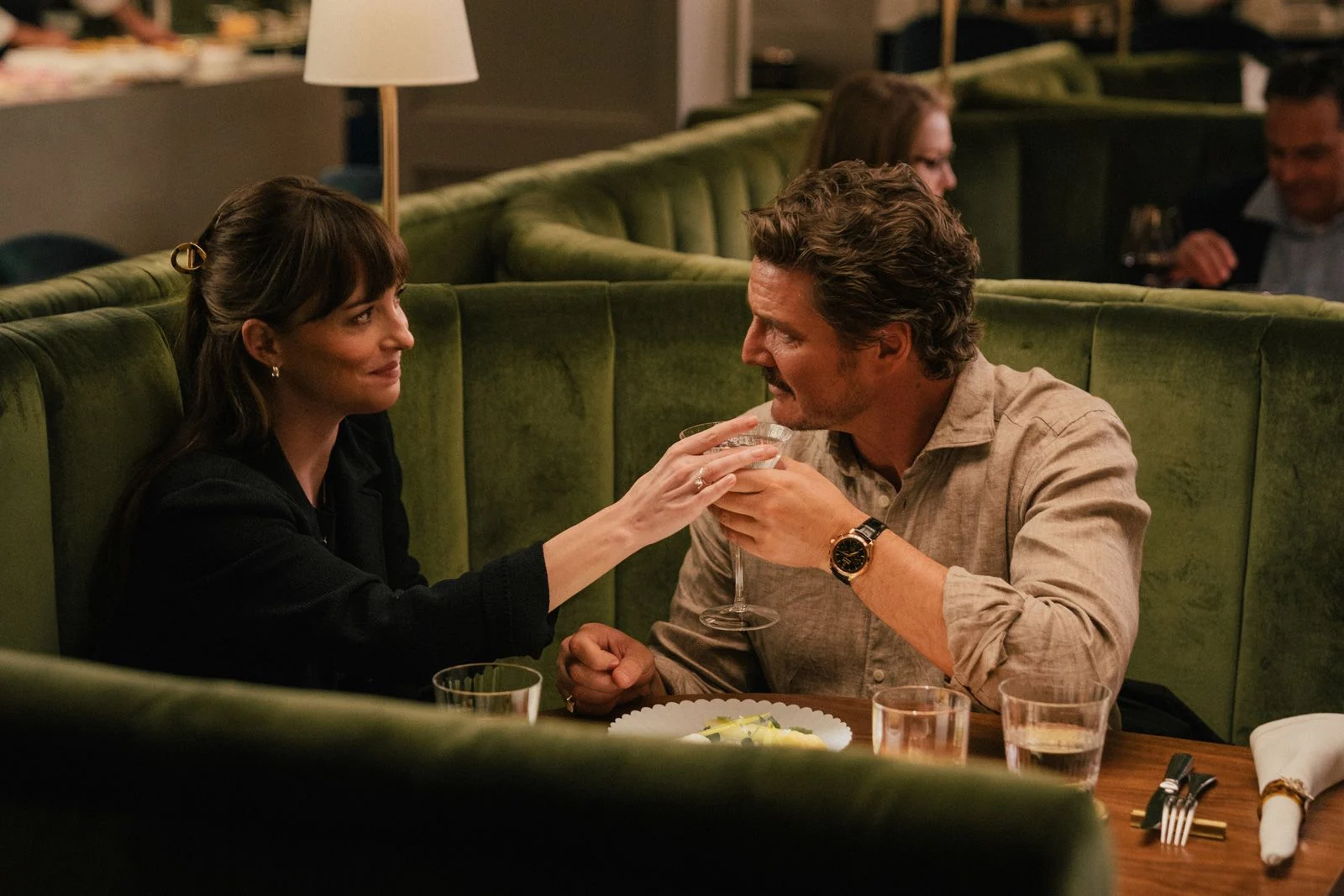A series of faces file past the screen, one after the other stating their criteria for the perfect partner – they must be over six foot, make more than 200k, have a nice smile, enjoy the same things, be “fit”. Successful matchmaker Lucy Mason (Dakota Johnson) takes note with pursed lips – of course, she will find them their perfect match. Enter Materialists, Celine Song’s latest following the success of Past Lives, a less nostalgic, less romantic tale anchored in genuine(ly alarming) social commentary of today’s dating lifestyle. Stylish and well-acted, there are certainly a couple of wobbles in terms of execution and a questionable ending that arguably defies the entire film – but what Materialists is more than anything is refreshingly transparent about what we actually want, sans artifice.
Johnson plays Lucy, a failed actress turned matchmaker, exquisitely dressed and bafflingly good at her job. When we first meet her, she is at a loss with what to do with one of her clients, Sophie (Zoe Winters in a raw standout performance), who has been on eight dates to no avail. “There’s nothing wrong with her”, Lucy confides to her boss Violet (Marin Ireland), sipping wine from the window of a gorgeous New York office block. Even when Sophie is ready to lower her expectations (the most recent man to reject her is “balding”), nothing seems to stick. Unsurprisingly, Lucy’s job makes her the “eternal bachelorette” (voluntarily), but at the wedding of a couple she paired up, she meets charming private equity partner Harry Castillo (Pedro Pascal), who is immediately smitten with her. Coincidentally, her ex-boyfriend John (Chris Evans) is working as a caterer at the wedding – two men available to her when most of her clients struggle to find even one. As her feelings between her old flame and the lifestyle her new one can afford intertwine, a disaster at work forces Lucy to consider what really matters to her – and what she is willing to give up.
While exquisitely filmed with reasonable stakes, Materialists suffers from a case of slightly poor pacing, especially as Lucy and Harry begin their relationship, locking in for the long run three dinners and outfit changes later. An extra couple of scenes might have sufficed to iron this out, while elsewhere, instances feel too drawn out or overly convoluted for very little reason. Though refreshingly respectful (there are no sword fights over the fair maiden), the love triangle creates an inevitable “which one” feeling that leaves the ending a little drab, cancelling out a lot of the good work Song’s script has done up until then. Nevertheless, it is pleasing to watch, both from an aesthetic and conversational point of view – its commitment to depicting modern dating as honestly as possible is truly novel, and even as Lucy’s monologue on dating as maths grows slightly old, the reality of it is that she does have a point. Take criticism surrounding the film about how unlikable the characters are, for instance – Lucy maintains that she is an awful ‘materialist’, yet she is simply responding to a difficult childhood in as best a way as she can. Likewise, neither Harry nor John ever fight over her – they are cordial with each other, and respectful of her, willing to listen and love her despite her faults. Why are we, then, so quick to judge fictional characters when the whole point of the film they are in is that everyone has baggage, yet no one is willing to concede? While men desire someone “fit”, under thirty but over twenty five (desperate on one side, immature on the other), women look for height, physical and in salary – it’s either a long wait, or settling. Though there are some amusing sequences throughout, it is also irrevocably sad – most notably, a bride who is marrying her fiancé because he makes her sister jealous, and Harry’s secret, which genuinely had me in tears. This push to find the perfect partner who “ticks all the boxes” is truly what Song is pulling apart here, expertly so – in many ways, it’s a romantic drama with a bit of horror thrown in.





